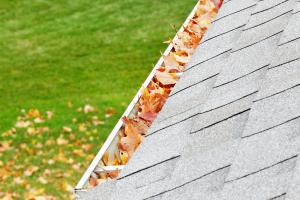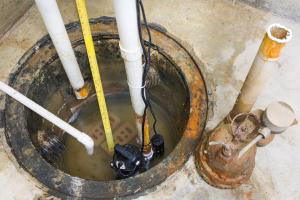Prepare for winter to help avoid potential insurance claims

As the temperature drops, the risk of winter-related incidents such as frozen pipes, damaged exteriors and more goes up. Making home maintenance a priority in the fall can help identify potential problems early and reduce the chance of an insurance claim in the future.
Here are some home maintenance tips to help you prepare for the coming winter, if you can perform them yourself safely:
Outdoor
- Check your gutters for damage and make sure they’re secured to your house. Clean out gutters to keep debris (like falling leaves, sticks and ice) from accumulating. This can help prevent moisture build up and an ice dam from forming, which can damage your roof or siding.
- Check your eavestroughs and downspouts for debris to allow for proper water drainage, preventing water from entering the foundation of your house and flooding your basement. Position downspouts to deposit water 3-4 feet away from the foundation.
- Assess your roof for leaks and cracks, and check the seal around the chimney and skylights in order to be prepared for heavy snow.
- Trim tree limbs hanging over your house to avoid falling and damage during a storm. Contact a professional if your tree limbs are hanging over power lines.
- Chalk and seal around all windows and doors.
- Store your grill, outdoor furniture and garden decorations to prevent damage from weathering a storm and to be sure they do not blow around and cause damage to your house.
- Empty water from all garden hoses and swimming pool water supply lines, disconnect them and store them for the winter months.
- If you have a sprinkler system, winterize it.
Indoor
- Whether you are home or not, keep your thermostat set no lower than 55 degrees Fahrenheit.
- When overnight temperatures plunge below freezing, allow warm water to trickle from faucets overnight.
- Add insulation to attics and crawl spaces to help retain heat.
- Consider fitting your pipes with insulation, especially if located near exterior walls.
- If you have water supply lines in the garage, keep those doors closed as much as possible.
- Get your furnace or boiler system checked before you start using heat regularly.
- Schedule a chimney sweep to clean your chimney every year.
- Open cabinets in your bedroom and kitchen to help circulate warmer air around those pipes.
- Service your generator to ensure it will perform well all winter.
A little extra attention now can help safeguard your home all winter long. Contact your independent insurance agent to discuss home coverage options. Also, The Hanover offers devices that can help prevent small water incidents from becoming big problems.
Sources:
Related resources
Prepare for winter to help avoid potential insurance claims
As the temperature drops, the risk of winter-related incidents such as frozen pipes, damaged exteriors and more goes up. Making home maintenance a priority in the fall can help identify potential problems early and reduce the chance of an insurance claim in the future.
Here are some home maintenance tips to help you prepare for the coming winter, if you can perform them yourself safely:
Outdoor
- Check your gutters for damage and make sure they’re secured to your house. Clean out gutters to keep debris (like falling leaves, sticks and ice) from accumulating. This can help prevent moisture build up and an ice dam from forming, which can damage your roof or siding.
- Check your eavestroughs and downspouts for debris to allow for proper water drainage, preventing water from entering the foundation of your house and flooding your basement. Position downspouts to deposit water 3-4 feet away from the foundation.
- Assess your roof for leaks and cracks, and check the seal around the chimney and skylights in order to be prepared for heavy snow.
- Trim tree limbs hanging over your house to avoid falling and damage during a storm. Contact a professional if your tree limbs are hanging over power lines.
- Chalk and seal around all windows and doors.
- Store your grill, outdoor furniture and garden decorations to prevent damage from weathering a storm and to be sure they do not blow around and cause damage to your house.
- Empty water from all garden hoses and swimming pool water supply lines, disconnect them and store them for the winter months.
- If you have a sprinkler system, winterize it.
Indoor
- Whether you are home or not, keep your thermostat set no lower than 55 degrees Fahrenheit.
- When overnight temperatures plunge below freezing, allow warm water to trickle from faucets overnight.
- Add insulation to attics and crawl spaces to help retain heat.
- Consider fitting your pipes with insulation, especially if located near exterior walls.
- If you have water supply lines in the garage, keep those doors closed as much as possible.
- Get your furnace or boiler system checked before you start using heat regularly.
- Schedule a chimney sweep to clean your chimney every year.
- Open cabinets in your bedroom and kitchen to help circulate warmer air around those pipes.
- Service your generator to ensure it will perform well all winter.
A little extra attention now can help safeguard your home all winter long. Contact your independent insurance agent to discuss home coverage options. Also, The Hanover offers devices that can help prevent small water incidents from becoming big problems.
Sources:
Related resources
Prepare for winter to help avoid potential insurance claims
As the temperature drops, the risk of winter-related incidents such as frozen pipes, damaged exteriors and more goes up. Making home maintenance a priority in the fall can help identify potential problems early and reduce the chance of an insurance claim in the future.
Here are some home maintenance tips to help you prepare for the coming winter, if you can perform them yourself safely:
Outdoor
- Check your gutters for damage and make sure they’re secured to your house. Clean out gutters to keep debris (like falling leaves, sticks and ice) from accumulating. This can help prevent moisture build up and an ice dam from forming, which can damage your roof or siding.
- Check your eavestroughs and downspouts for debris to allow for proper water drainage, preventing water from entering the foundation of your house and flooding your basement. Position downspouts to deposit water 3-4 feet away from the foundation.
- Assess your roof for leaks and cracks, and check the seal around the chimney and skylights in order to be prepared for heavy snow.
- Trim tree limbs hanging over your house to avoid falling and damage during a storm. Contact a professional if your tree limbs are hanging over power lines.
- Chalk and seal around all windows and doors.
- Store your grill, outdoor furniture and garden decorations to prevent damage from weathering a storm and to be sure they do not blow around and cause damage to your house.
- Empty water from all garden hoses and swimming pool water supply lines, disconnect them and store them for the winter months.
- If you have a sprinkler system, winterize it.
Indoor
- Whether you are home or not, keep your thermostat set no lower than 55 degrees Fahrenheit.
- When overnight temperatures plunge below freezing, allow warm water to trickle from faucets overnight.
- Add insulation to attics and crawl spaces to help retain heat.
- Consider fitting your pipes with insulation, especially if located near exterior walls.
- If you have water supply lines in the garage, keep those doors closed as much as possible.
- Get your furnace or boiler system checked before you start using heat regularly.
- Schedule a chimney sweep to clean your chimney every year.
- Open cabinets in your bedroom and kitchen to help circulate warmer air around those pipes.
- Service your generator to ensure it will perform well all winter.
A little extra attention now can help safeguard your home all winter long. Contact your independent insurance agent to discuss home coverage options. Also, The Hanover offers devices that can help prevent small water incidents from becoming big problems.
Sources:
Related resources
Prepare for winter to help avoid potential insurance claims
As the temperature drops, the risk of winter-related incidents such as frozen pipes, damaged exteriors and more goes up. Making home maintenance a priority in the fall can help identify potential problems early and reduce the chance of an insurance claim in the future.
Here are some home maintenance tips to help you prepare for the coming winter, if you can perform them yourself safely:
Outdoor
- Check your gutters for damage and make sure they’re secured to your house. Clean out gutters to keep debris (like falling leaves, sticks and ice) from accumulating. This can help prevent moisture build up and an ice dam from forming, which can damage your roof or siding.
- Check your eavestroughs and downspouts for debris to allow for proper water drainage, preventing water from entering the foundation of your house and flooding your basement. Position downspouts to deposit water 3-4 feet away from the foundation.
- Assess your roof for leaks and cracks, and check the seal around the chimney and skylights in order to be prepared for heavy snow.
- Trim tree limbs hanging over your house to avoid falling and damage during a storm. Contact a professional if your tree limbs are hanging over power lines.
- Chalk and seal around all windows and doors.
- Store your grill, outdoor furniture and garden decorations to prevent damage from weathering a storm and to be sure they do not blow around and cause damage to your house.
- Empty water from all garden hoses and swimming pool water supply lines, disconnect them and store them for the winter months.
- If you have a sprinkler system, winterize it.
Indoor
- Whether you are home or not, keep your thermostat set no lower than 55 degrees Fahrenheit.
- When overnight temperatures plunge below freezing, allow warm water to trickle from faucets overnight.
- Add insulation to attics and crawl spaces to help retain heat.
- Consider fitting your pipes with insulation, especially if located near exterior walls.
- If you have water supply lines in the garage, keep those doors closed as much as possible.
- Get your furnace or boiler system checked before you start using heat regularly.
- Schedule a chimney sweep to clean your chimney every year.
- Open cabinets in your bedroom and kitchen to help circulate warmer air around those pipes.
- Service your generator to ensure it will perform well all winter.
A little extra attention now can help safeguard your home all winter long. Contact your independent insurance agent to discuss home coverage options. Also, The Hanover offers devices that can help prevent small water incidents from becoming big problems.
Sources:





